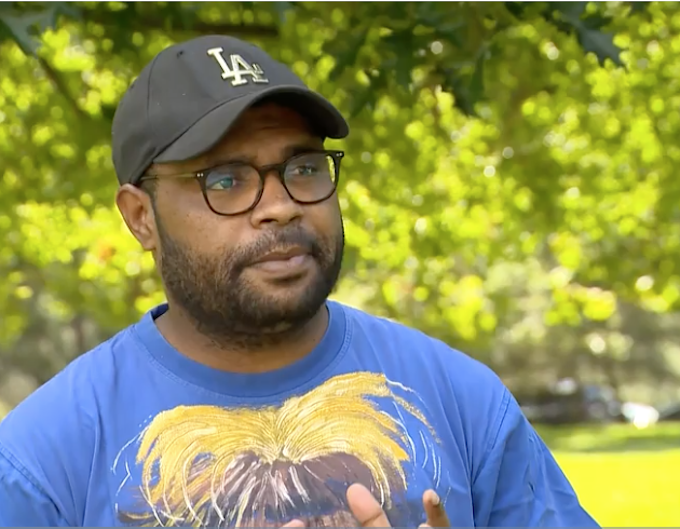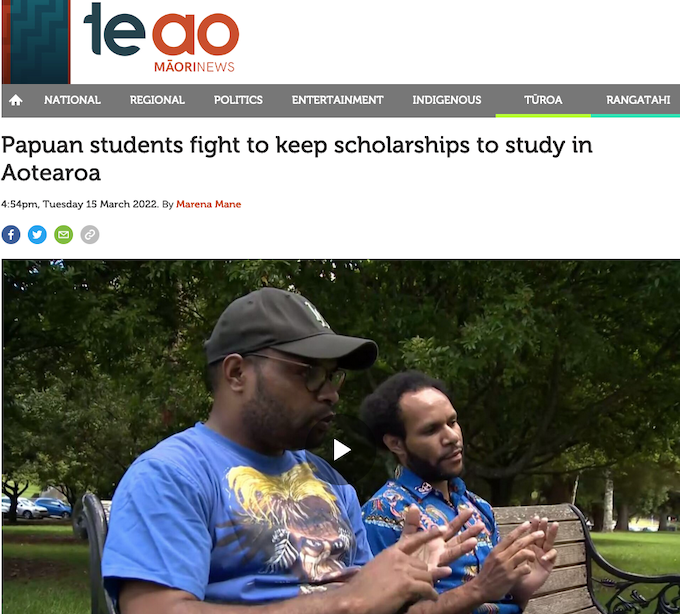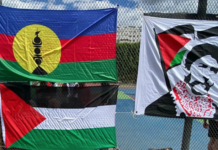
By Marena Mane of Māori Television
Indigenous students from West Papua studying at universities across Aotearoa are defying an order from the Indonesian government to return home.
In January, more than 40 students were told that Indonesia would no longer be funding autonomous West Papuan scholarships so they had to pack up and leave.
Laurens Ikinia of the Hubula tribe and fellow student Esniel Mirin of the Kimyal tribe, both from the central highlands of West Papua, say they have been stripped of their dream for a brighter future.
- READ MORE: Overcoming trauma, Papuan students in NZ now face new challenge
- Other West Papuan student articles
- WATCH: Te Ao Māori News video
“The government has terminated about 42 students here in Aotearoa New Zealand who are the recipients of Papua provincial government scholarships and I am one of the students who was terminated and this is really worrying me,” Ikinia said.
Ikinia and Mirin have both been struggling to support themselves since the scholarship decision was made. Living costs are rising and tuition fees are high for overseas students here.
“What we are trying to do just to survive is do some part-time jobs as long as we can but, unfortunately, some students cannot work because of their visa conditions. I don’t know how long it’s going to take us but that’s what we are doing just to survive,” Ikinia said.
Mirin said he found it hard to talk about the issue as he was not able to support himself and not able to work.
“I’m trying to communicate with my close friends from the campus or the churches I attend and they help me a lot,” he said.
“We are calling the Indonesian President, Joko Widodo, to respond to our request so in the future we can continue our programmes and success because this is kind of Indonesians trying to manipulate our education rights.”
West Papuan students fight to keep #scholarships to study in #Aotearoa #AsiaPacificReport #WestPapua @westpapuamedia @westpapuanews @LaurensIkinia #TeAoMaoriNews #education @VictorcMambor #nzpol https://t.co/mFfkHSvIqq pic.twitter.com/nj4toFIwPF
— David Robie (@DavidRobie) March 17, 2022
The Indonesian embassy gave a written response to Māori Television’s request for comment, stating that the scholarships were wholly managed by Papua’s democratically elected provincial government. The embassy also said:
“These students are part of a total of 593 students from Papua province receiving the ‘Papua Special Autonomy Scholarship’… only those who have exceeded the allocated time of the scholarship and those who cannot meet the academic requirements are being recalled.
“The decision to repatriate certain students does not impact on those students who remain on track with regards to their studies abroad.
“The assessment is also conducted to ensure other eligible students from Papua province also obtain the same opportunity in pursuing their studies.”

The embassy also said it had tried to resolve various aspects of the issue including possible outstanding tuition and living fees.
But for students such as Ikinia the suggestion he is being sent home because he has been failing, has no foundation.
“I came to New Zealand in 2016, I did my New Zealand language programme for five months and then I studied my international contemporary studies, bachelor programme, I studied in 2017 and then I finished in 2019 in three years and then I studied for my master’s programme in 2020,” he says.
“I’m just about to finish and then they put my name on the list and then they claim that I’m not making any progress, which is baseless. This is something that we have written a letter to the government to clarify — the evidence that the government used to categorise all these 42 students not making progress.”
Ikinia is reaching out to institutions, organisations and communities for their support on behalf of the Papuan Students Association of Oceania.
“We humbly request the people of Aotearoa, New Zealand to open your arms to welcome us as a Pacific family.
“It’s been a long, long time where West Papuans, indigenous peoples have not spoken about our education rights and we are calling for the sake of humanity.”
- For more information, readers can visit the Papuan Students Association Oceania social media pages to learn how to offer support:
- Email: papuanstudentsoceania@gmail.com
Marena Mane is a Te Ao Māori News reporter. Republished with permission.










































